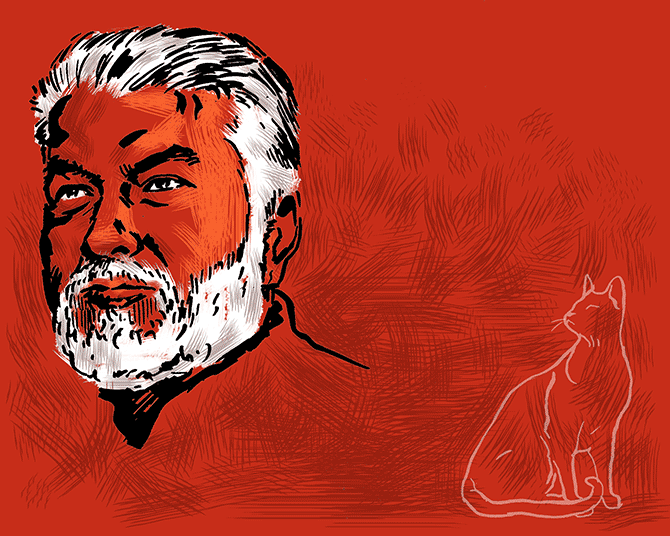Perumal Murugan's Songs Of A Coward reminds Uttaran Das Gupta of Orwell's Animal Farm and Ionesco's The Rhinoceros.
Both works, as well as Murugan's stark poetry, are poignant for our times, when political figures build personality cults around themselves and demand absolute loyalty.
Illustration: Dominic Xavier/Rediff.com

Tamil poet and novelist Perumal Murugan is a cat lover.
His poetic journey began when he was eight or nine years old with a poem, Poonai nalla poonai, on a favourite cat. (He revealed this in a speech delivered in New Delhi on August 22, 2016.)
Like many feline lovers, he is not too fond of dogs.
This is evident in his new book of poems, Songs Of A Coward, where the poet's personal preference is a narrative leitmotif and as a thematic preoccupation.
Dogs and canine creatures such as wolves are antagonists and bearers of disease.
For instance, The Howls, which begins with a rabid dog arriving at a settlement: Piercing through/the dense midnight dark/that had dry leaves for eyes/came a rabid dog.
This sick dog bites other dogs, which in turn bite cattle and chickens and domestic dogs. These creatures, in turn, bite humans: Men grew fearful/Those who ventured out/...rushed back in with bloody wounds.
The final image of the poem is devastating: Drooling tongues/Howls/Packs of rabid dogs.
This reminds one of two seminal works of literature: George Orwell's Animal Farm and Eugene Ionesco's The Rhinoceros.
Orwell's 1945 novel is an allegorical critique of Stalinist Russia set on the eponymous animal farm, where pigs -- representing the Bolshevik elite -- capture power after driving the original human owners away.
In Ionesco's absurdist play, all characters except the protagonist Bérenger -- a sort of a common man -- turns into rhinoceroses, representing the conformism demanded by Fascism or Nazism.
Both works, as well as Murugan's stark poetry, are poignant for our times, when political figures build personality cults around themselves and demand absolute loyalty.
The Howls is also a close cousin of zombie genre movies, where all characters become rabid, flesh-eating monsters.
The conditions under which Murugan has produced this book, with 210 short poems, provide a hint to his preoccupations.
In January 2015, following widespread controversy over his novel Madhurobhagan, during which he was forced to render an apology for his depiction of the rituals of the Ardhanareeshwarar temple in Tiruchengode and court cases were initiated against him, Murugan declared himself dead.
On a Facebook post, he wrote: 'Perumal Murugan the writer is dead. As he is no God, he is not going to resurrect himself. He also has no faith in rebirth. An ordinary teacher, he will live as P Murugan. Leave him alone.'
The poems in this book, as its subtitle suggests, are 'poems of exile'.
Their translator Aniruddhan Vasudevan, who also translated Madhurobhagan as One Part Woman, writes: 'He (Murugan' wrote these poems during that period of exile when he was struggling to find his bearings, trying to make sense of all that was happening in his life and how it might affect his existence as a person and writer...'
'They record private emotions, acute vulnerability and a constant sense of acutely moving around a space to see how hospitable, inhabitable and welcoming it might be -- or not.'
A sense of unease permeates the early poems of the book.
In A Strange Beast, Murugan's narrator is acutely aware of the reactions of people he meets: My very existence becomes a threat/to anyone I meet.
The poem goes on to describe his transformation from a regular person to a threatening beast: Someone has painted over my head/a pair of horns everyone can see/Someone has turned me into a strange beast. (Echoes of Kafka?)
He also knows how he inconveniences his antagonists: For some, my beard is an inconvenience /For some, my writing is an inconvenience/For some, my existence is an inconvenience (A Drop of Bother).
But this book is also a journey, from uncertainty to certainty, from death to resurrection, from disease to therapy.
In the speech, with which I began this review, Murugan describes a personal crisis between December 2014 and January 2016: 'I couldn't so much as scratch a line... I couldn't read a thing... I realised the full meaning of the Tamil phrase nadaipinam (a walking corpse)'.
What is a writer if he has declared himself dead? But, it is through writing that Murugan makes a rebirth: 'As I started to write, I began to revive little by little, from my fingernails to my hair. It was poetry that saved me.'
The therapeutic nature of writing is not unknown: Wordsworth described it in Tintern Abbey; writing is used extensively in therapy.
Murugan's 'death' was a choice -- unlike say Pansare, Dabholkar, Kalburgi, or Lankesh.
To give in to despair is perhaps a cop out, but to write also requires enormous courage.
The poems in this book are not that of a coward. Murugan isn't a coward; perhaps, he is a cat.











